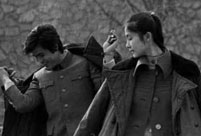 |
| China's first moon rover, Yutu, or Jade Rabbit, and the lander took photos of each other on the moon's surface. (People's Daily online) |
In Chinese mythology, Chang’e is the fairy who lives on the moon holding a Yutu (Jade rabbit) in her arms. Now, the myth has come true. The Chang’e lunar probe has landed on the moon and Yutu rover is now walking on the surface. “Made in China” has left its footprints on the moon. Several decades ago, when Chinese Chemist Ouyang Ziyuan received a 0.5g sample of moon rock as a present from the US, he was so excited and so careful with it, as if he was holding an invaluable treasure in his hand. Now, the whole of the moon,weighing 7.33 ×10^22 kilograms, has opened itself to China.
“Does the moon-landing have anything to do with us?” This question is being asked on almost all TV programs and network Broadcasts. Whether out of personal curiosity or concern for the level of public finance being spent, people are entitled to ask the question.
In fact, even in the financially sound Western countries, Samuel Chao Chung Ting, Nobel Prize winner, has faced similar questions on numerous occasions. His response carries weight: “I am very clear about this matter and I want to share my views with you. For our particle accelerator experiment of the past 5 decades, in order to obtain funding we needed to draft a proposal and specify our goals to convince the government. But it turned out that our discoveries had nothing to do with our original goals.”
Samuel Chao Chung Ting was speaking the truth.
Exploring the possibility of mining and exploiting energy on the moon, achieving developments in a new and unique ultrahigh vacuum, weak gravity and magnetic field-free environment, establishing an outpost or a transfer station for further space probes - all of these are goals of the lunar probe project, but one thing is certain. There will be more unanticipated benefits.
It is said that the internet was a by-product of the Apollo Moon Landing Project, because scientists wanted to share information by connecting the computers in the NASA Space Center. Nuclear magnetic resonance, laser communication, LCD TV, and the mobile phone that we can’t live without nowadays---the requirements of manned moon landing provided impetus for technological breakthroughs in all of these fields. Of course, none of these inventions appeared in the initial proposals for the Apollo Project.
All long-term strategic projects such as the Manhattan Project, Apollo Project, Human Genome Project, 863 Project, the manned space flight project, Chang’e lunar probe, will eventually have an impact on the daily life of ordinary people at some point in the future. It may take years even decades of years to see the effect. If we have no strategic vision, we will miss great opportunities.
Back at the end of the 20th century, China hesitated about whether to take on 1 percent of the human genome sequencing work. Even after its completion, arguments still existed within China’s scientific community. But along with the development of gene research, the whole sequencing project has become the essential data foundation stone for genetic engineering. The ability to process and analyze genetic data on a large scale is the key to occupying the commanding heights in this field. And on a practical level, gene sequencing is the most convenient and radical way to prevent and treat afflictions such as Down’s syndrome, cervical cancer, congenital deafness and other common hereditary diseases. If we had yielded to the challenge of “what’s the use of it” and abandoned our efforts in fighting this protracted battle, China would now be 10 years behind in this new strategic area.
Being selective on what we do is the principle of our innovation strategy, but this is not an excuse for inaction. With a strategic perspective, we will strive to achieve success through hard work and persistence, and that is the true sign of wisdom.
 Heavy cargo flights taking off
Heavy cargo flights taking off In pictures: PLA's digital equipment
In pictures: PLA's digital equipment  Americans mark Thanksgiving Day with parades
Americans mark Thanksgiving Day with parades Love searching stories in cities
Love searching stories in cities  Shanghai shrouded in heavy fog
Shanghai shrouded in heavy fog Office ladies receive ‘devil’ training in mud
Office ladies receive ‘devil’ training in mud Changes in Chinese dancing culture
Changes in Chinese dancing culture  Highlight of Mr Bodybuilding and Miss Bikini Contest
Highlight of Mr Bodybuilding and Miss Bikini Contest  Picturesque scenery of Huanglong, NW China
Picturesque scenery of Huanglong, NW China 17th joint patrol of Mekong River to start
17th joint patrol of Mekong River to start The islands where immortals lived
The islands where immortals lived Snowstorms cause chaos for travelers
Snowstorms cause chaos for travelers Special police detachment of Hefei
Special police detachment of Hefei  Weekly Sports Photos
Weekly Sports Photos China's moon rover, lander
China's moon rover, landerDay|Week|Month